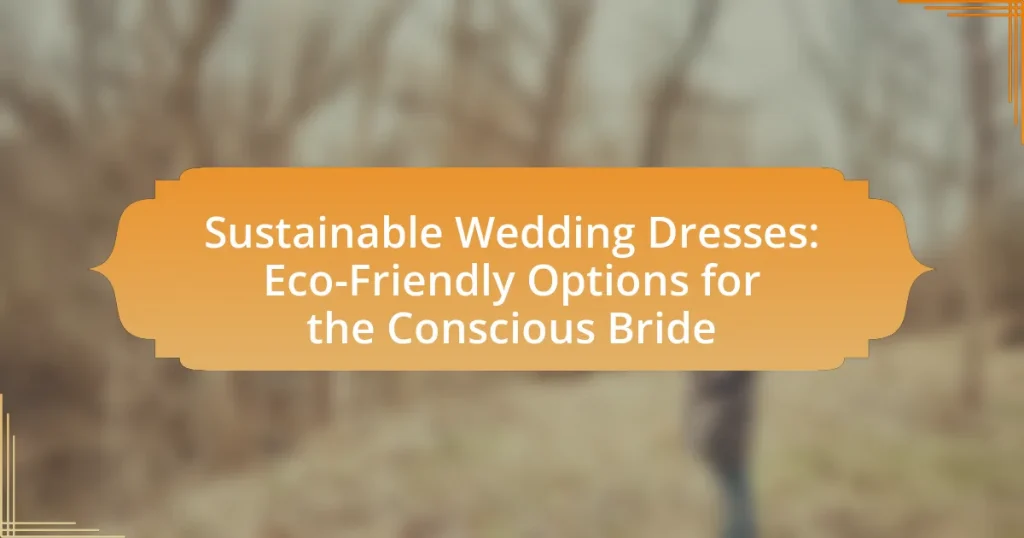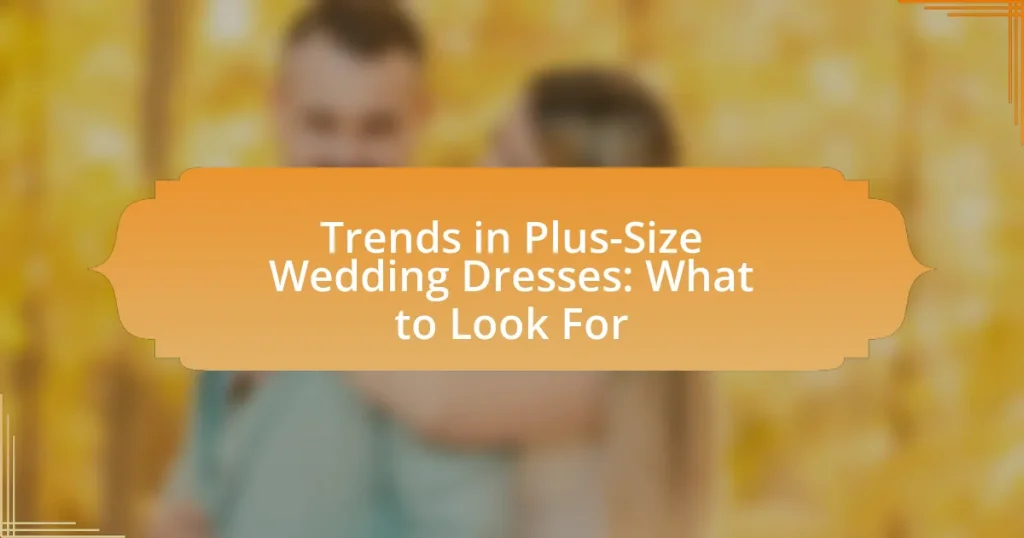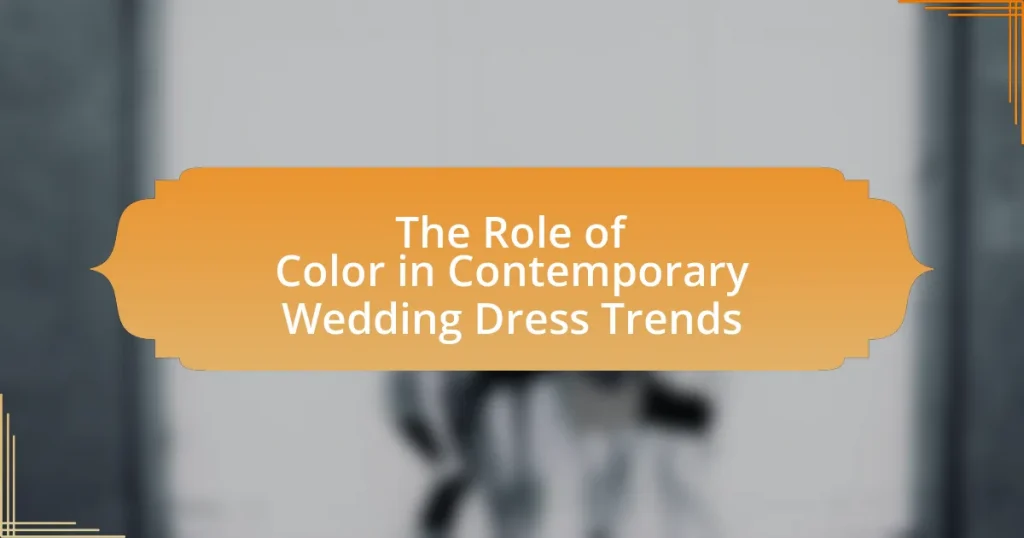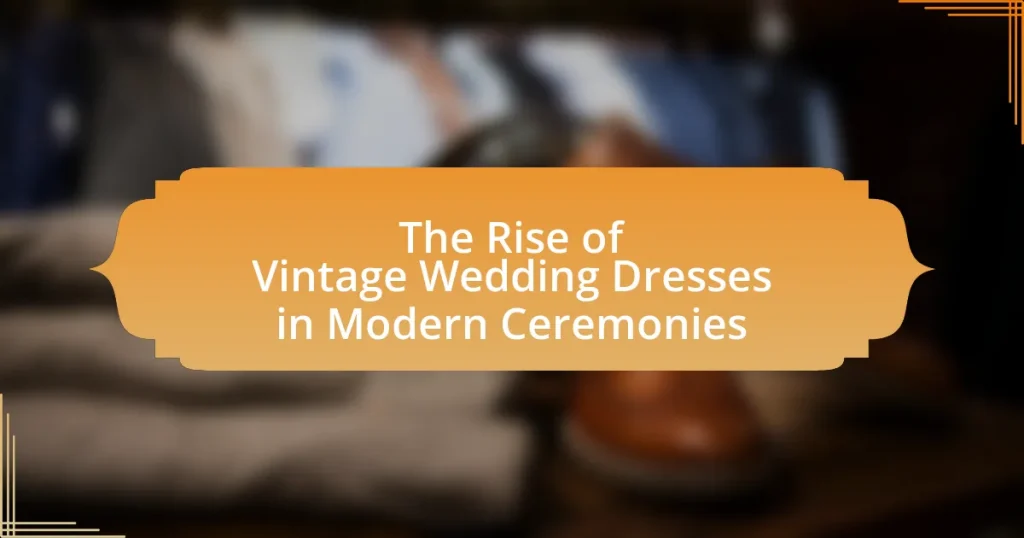Sustainable wedding dresses are garments designed for eco-conscious brides, emphasizing environmental and ethical considerations in their production. These dresses are crafted from eco-friendly materials such as organic cotton, hemp, and recycled fabrics, and are produced using sustainable practices that minimize waste and reduce carbon footprints. The article explores the differences between sustainable and traditional wedding dresses, the materials commonly used, the environmental benefits, and the importance of ethical fashion practices. It also discusses various styles and customization options available, as well as tips for finding, purchasing, and caring for sustainable wedding dresses, while addressing common misconceptions and providing resources for brides seeking eco-friendly options.
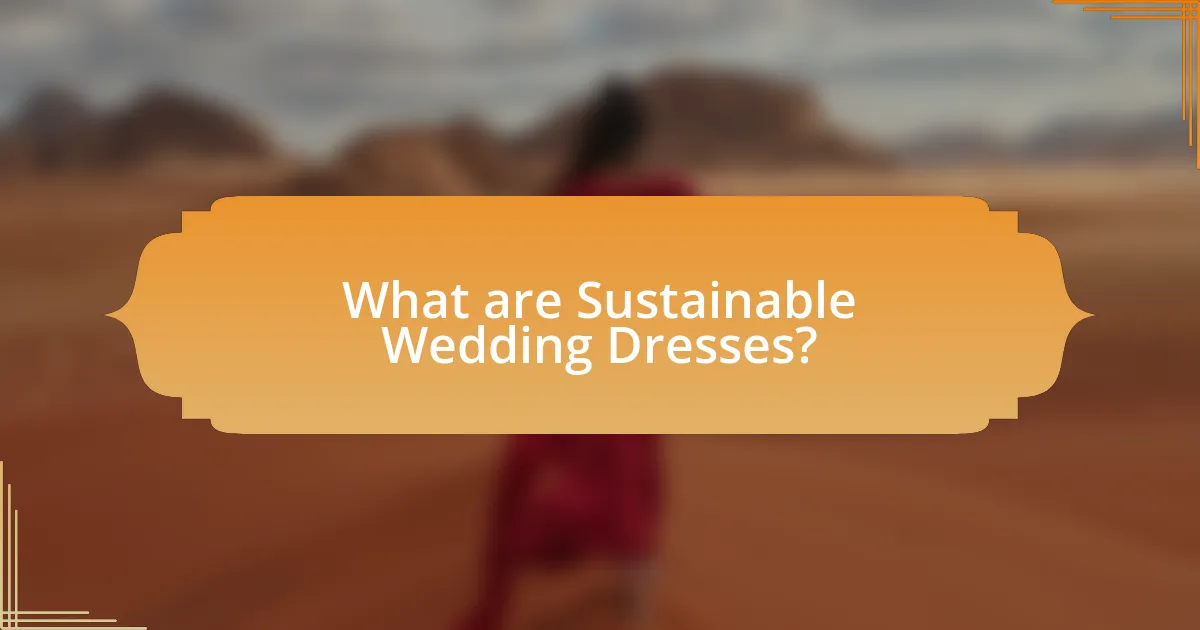
What are Sustainable Wedding Dresses?
Sustainable wedding dresses are garments designed for weddings that prioritize environmental and ethical considerations in their production. These dresses are typically made from eco-friendly materials, such as organic cotton, hemp, or recycled fabrics, and are produced using sustainable practices that minimize waste and reduce carbon footprints. For instance, brands like Reformation and Grace Loves Lace focus on transparency in their supply chains and use low-impact dyes, which further supports the sustainability ethos.
How do Sustainable Wedding Dresses differ from traditional options?
Sustainable wedding dresses differ from traditional options primarily in their materials and production processes. Sustainable dresses are made from eco-friendly fabrics such as organic cotton, hemp, or recycled materials, which reduce environmental impact, while traditional dresses often utilize synthetic fabrics like polyester that contribute to pollution. Additionally, sustainable options typically emphasize ethical labor practices, ensuring fair wages and safe working conditions, whereas traditional options may not prioritize these factors. According to a report by the Ellen MacArthur Foundation, the fashion industry is responsible for 10% of global carbon emissions, highlighting the importance of choosing sustainable alternatives to mitigate environmental harm.
What materials are commonly used in Sustainable Wedding Dresses?
Sustainable wedding dresses commonly utilize materials such as organic cotton, hemp, linen, Tencel, and recycled fabrics. Organic cotton is grown without harmful pesticides, making it a safer choice for the environment. Hemp is a durable and biodegradable fabric that requires minimal water and no pesticides. Linen, derived from the flax plant, is also biodegradable and has a low environmental impact. Tencel, made from sustainably sourced wood pulp, is known for its softness and biodegradability. Recycled fabrics, including those made from post-consumer waste, help reduce landfill contributions and resource consumption. These materials collectively contribute to the eco-friendliness of sustainable wedding dresses.
How does the production process of Sustainable Wedding Dresses impact the environment?
The production process of sustainable wedding dresses positively impacts the environment by utilizing eco-friendly materials and practices that reduce waste and carbon emissions. Sustainable wedding dresses are often made from organic fabrics, such as organic cotton or hemp, which require fewer pesticides and fertilizers compared to conventional materials, thus minimizing soil and water pollution. Additionally, many sustainable brands implement ethical manufacturing processes that prioritize fair labor practices and reduce energy consumption, further decreasing their environmental footprint. For instance, a study by the Ellen MacArthur Foundation highlights that the fashion industry is responsible for 10% of global carbon emissions, and shifting to sustainable practices can significantly mitigate this impact.
Why are Sustainable Wedding Dresses important for eco-conscious brides?
Sustainable wedding dresses are important for eco-conscious brides because they minimize environmental impact and promote ethical practices in the fashion industry. These dresses are typically made from organic or recycled materials, reducing waste and pollution associated with traditional garment production. For instance, the fashion industry is responsible for approximately 10% of global carbon emissions, and sustainable practices can significantly lower this figure. Additionally, many sustainable brands prioritize fair labor practices, ensuring that workers are treated ethically and paid fairly. This alignment with eco-conscious values makes sustainable wedding dresses a vital choice for brides who wish to reflect their commitment to environmental and social responsibility on their special day.
What are the environmental benefits of choosing a Sustainable Wedding Dress?
Choosing a sustainable wedding dress significantly reduces environmental impact by minimizing waste and resource consumption. Sustainable wedding dresses are often made from eco-friendly materials, such as organic cotton or recycled fabrics, which require less water and energy to produce compared to conventional fabrics. For instance, organic cotton uses 91% less water than traditional cotton farming, according to the Organic Trade Association. Additionally, sustainable practices in the production process, such as ethical labor and reduced chemical use, contribute to lower pollution levels. By opting for a sustainable wedding dress, brides can help decrease the carbon footprint associated with the fashion industry, which is responsible for approximately 10% of global carbon emissions.
How do Sustainable Wedding Dresses contribute to ethical fashion practices?
Sustainable wedding dresses contribute to ethical fashion practices by utilizing eco-friendly materials and promoting fair labor conditions. These dresses are often made from organic fabrics, such as organic cotton or hemp, which reduce environmental impact compared to conventional materials. Additionally, many sustainable brands ensure that their production processes adhere to ethical labor standards, providing fair wages and safe working conditions for garment workers. For instance, a study by the Ethical Fashion Forum highlights that sustainable fashion can reduce carbon emissions by up to 30% compared to traditional fashion practices. This commitment to sustainability and ethics not only minimizes environmental harm but also supports social responsibility within the fashion industry.

What types of Sustainable Wedding Dresses are available?
Sustainable wedding dresses are available in several types, including those made from organic cotton, hemp, recycled fabrics, and vintage or second-hand garments. Organic cotton dresses are produced without harmful pesticides, while hemp is a durable and biodegradable option. Recycled fabric dresses utilize materials like repurposed polyester, reducing waste. Vintage or second-hand dresses promote sustainability by reusing existing garments, thus minimizing the environmental impact associated with new production. These options cater to eco-conscious brides seeking to reduce their carbon footprint while maintaining style.
What are the different styles of Sustainable Wedding Dresses?
Sustainable wedding dresses come in various styles, including A-line, sheath, ball gown, and tea-length designs. A-line dresses are characterized by a fitted bodice that gradually flares out, making them flattering for many body types. Sheath dresses fit closely to the body and often feature minimalistic designs, appealing to brides seeking a modern look. Ball gowns offer a dramatic silhouette with a full skirt, ideal for traditional weddings. Tea-length dresses, which fall between the knee and ankle, provide a vintage charm and are often made from eco-friendly fabrics like organic cotton or recycled materials. Each style can incorporate sustainable practices, such as ethical sourcing and environmentally friendly production methods, ensuring that the dress aligns with eco-conscious values.
How can brides choose a style that fits their personal aesthetic?
Brides can choose a style that fits their personal aesthetic by identifying their preferences in color, silhouette, and fabric, while also considering sustainable options that align with eco-friendly values. Research indicates that understanding personal style involves reflecting on individual tastes, such as vintage, modern, or bohemian influences, which can guide the selection of sustainable wedding dresses made from organic materials or recycled fabrics. By exploring designers who prioritize sustainability, brides can find styles that not only resonate with their aesthetic but also support environmentally conscious practices in the wedding industry.
What are some popular designers known for Sustainable Wedding Dresses?
Some popular designers known for sustainable wedding dresses include Stella McCartney, known for her commitment to eco-friendly materials and ethical production practices; Reformation, which emphasizes sustainable fabrics and transparent supply chains; and Claire Pettibone, who uses vintage lace and sustainable practices in her designs. These designers have gained recognition for their efforts to create beautiful, environmentally conscious wedding attire, appealing to brides who prioritize sustainability in their wedding planning.
What are the options for customizing Sustainable Wedding Dresses?
Options for customizing sustainable wedding dresses include selecting eco-friendly fabrics, choosing specific silhouettes, and incorporating personalized embellishments. Eco-friendly fabrics such as organic cotton, hemp, and Tencel are popular choices that reduce environmental impact. Brides can also opt for various silhouettes, from A-line to mermaid styles, to suit their personal taste. Additionally, customization can involve adding unique elements like embroidery, lace overlays, or sustainable accessories, allowing for a distinctive look while maintaining sustainability. These options ensure that the wedding dress aligns with both personal style and eco-conscious values.
How can brides personalize their Sustainable Wedding Dress while maintaining eco-friendliness?
Brides can personalize their sustainable wedding dress by incorporating unique elements such as custom embroidery, upcycled fabrics, or vintage lace while ensuring eco-friendliness. Custom embroidery allows brides to add personal messages or designs that reflect their individuality, using organic threads to maintain sustainability. Upcycled fabrics, sourced from pre-existing garments, reduce waste and provide a distinctive look, while vintage lace can add a timeless touch without the environmental impact of new materials. These methods not only enhance the dress’s uniqueness but also align with eco-conscious practices, as they utilize resources that already exist, minimizing the carbon footprint associated with new fabric production.
What alterations can be made to enhance the sustainability of a dress?
To enhance the sustainability of a dress, one can use organic or recycled fabrics, implement zero-waste pattern cutting, and incorporate biodegradable embellishments. Organic fabrics, such as cotton or linen, reduce chemical use and environmental impact, while recycled materials, like polyester made from plastic bottles, help minimize waste. Zero-waste pattern cutting techniques maximize fabric usage, reducing off-cuts, and biodegradable embellishments ensure that the dress decomposes naturally at the end of its life cycle. These alterations collectively contribute to a more sustainable fashion approach, aligning with eco-friendly practices in the industry.

How can brides find and purchase Sustainable Wedding Dresses?
Brides can find and purchase sustainable wedding dresses by researching eco-friendly designers and retailers that prioritize ethical production practices. Many brands now offer collections made from organic materials, recycled fabrics, or vintage garments, which significantly reduce environmental impact. For instance, brands like Reformation and BHLDN focus on sustainable practices and transparency in their supply chains. Additionally, brides can explore second-hand options through platforms like Stillwhite or PreOwnedWeddingDresses, which promote circular fashion by allowing brides to buy and sell pre-loved gowns. This approach not only supports sustainability but also often provides cost savings.
What are the best places to shop for Sustainable Wedding Dresses?
The best places to shop for sustainable wedding dresses include brands like Reformation, which focuses on eco-friendly materials and ethical production practices, and BHLDN, known for its vintage-inspired gowns made from sustainable fabrics. Additionally, websites like Etsy offer a platform for independent designers who create custom, sustainable wedding dresses. These options are supported by the growing trend in the bridal industry towards sustainability, with a reported increase in demand for eco-conscious choices among brides.
How can online shopping for Sustainable Wedding Dresses be done responsibly?
Online shopping for sustainable wedding dresses can be done responsibly by prioritizing brands that use eco-friendly materials and ethical manufacturing practices. Responsible online shoppers should research the brand’s sustainability credentials, such as certifications like Global Organic Textile Standard (GOTS) or Fair Trade, which indicate adherence to environmental and social standards. Additionally, consumers can read reviews and testimonials to assess the brand’s commitment to sustainability and customer satisfaction. By choosing dresses made from organic fabrics or recycled materials, shoppers contribute to reducing environmental impact. Furthermore, supporting local designers can minimize carbon footprints associated with shipping.
What should brides look for when evaluating the sustainability of a dress?
Brides should look for materials, production processes, and the brand’s overall sustainability practices when evaluating the sustainability of a dress. Sustainable materials include organic cotton, linen, and recycled fabrics, which reduce environmental impact. Additionally, ethical production processes, such as fair labor practices and minimal waste, are crucial indicators of sustainability. Brands that prioritize transparency in their supply chain and have certifications like GOTS (Global Organic Textile Standard) or Fair Trade demonstrate a commitment to eco-friendly practices. These factors collectively ensure that the dress aligns with sustainable values.
What are some tips for caring for Sustainable Wedding Dresses?
To care for sustainable wedding dresses, gently hand wash the garment in cold water using a mild detergent to preserve the fabric and reduce environmental impact. Avoid harsh chemicals and opt for eco-friendly cleaning products, as they are less harmful to both the dress and the environment. Additionally, air dry the dress away from direct sunlight to prevent fading and damage. Storing the dress in a breathable garment bag made from natural fibers will help maintain its condition over time. These practices ensure the longevity of the dress while aligning with sustainable principles.
How can brides ensure their Sustainable Wedding Dress lasts beyond the wedding day?
Brides can ensure their sustainable wedding dress lasts beyond the wedding day by choosing high-quality, durable fabrics and proper care methods. Selecting materials such as organic cotton, linen, or recycled fabrics enhances longevity, as these are often more resilient than conventional options. Additionally, following care instructions, such as gentle washing and appropriate storage, preserves the dress’s condition. For instance, storing the dress in a breathable garment bag and avoiding direct sunlight can prevent deterioration. Research indicates that garments made from sustainable materials can have a longer lifespan, supporting the idea that quality and care are crucial for longevity.
What are the best practices for cleaning and storing a Sustainable Wedding Dress?
The best practices for cleaning and storing a sustainable wedding dress include using eco-friendly cleaning methods and proper storage techniques. To clean the dress, opt for a professional cleaner that specializes in eco-friendly processes, avoiding harsh chemicals that can damage natural fabrics. For storage, choose a breathable garment bag made from organic materials, and avoid plastic, which can trap moisture and lead to mold. Additionally, store the dress in a cool, dark place to prevent fading and deterioration. These practices help maintain the integrity of the sustainable materials used in the dress, ensuring it remains in excellent condition for years to come.
What are the common misconceptions about Sustainable Wedding Dresses?
Common misconceptions about sustainable wedding dresses include the belief that they are always more expensive, less stylish, and made from inferior materials. Many people think that sustainable options are prohibitively costly; however, prices can vary widely, and some sustainable dresses are competitively priced with traditional options. Additionally, the notion that sustainable wedding dresses lack style is inaccurate, as many designers create fashionable and modern designs using eco-friendly practices. Lastly, the assumption that sustainable dresses are made from inferior materials is misleading; in fact, many sustainable fabrics, such as organic cotton and Tencel, are high-quality and durable, often outperforming conventional materials in terms of comfort and environmental impact.
Why do some people believe Sustainable Wedding Dresses are more expensive?
Some people believe Sustainable Wedding Dresses are more expensive due to the higher costs associated with ethical sourcing, eco-friendly materials, and labor practices. Sustainable wedding dresses often utilize organic fabrics and environmentally friendly production methods, which can increase material costs. Additionally, brands that prioritize sustainability may invest in fair labor practices, leading to higher wages for workers, further contributing to the overall price. According to a report by the Ethical Fashion Forum, sustainable fashion can cost up to 30% more than conventional options due to these factors, reinforcing the perception of higher prices among consumers.
How can brides overcome the stigma associated with eco-friendly fashion?
Brides can overcome the stigma associated with eco-friendly fashion by showcasing the beauty and uniqueness of sustainable wedding dresses. By selecting designs that emphasize craftsmanship and style, brides can demonstrate that eco-friendly options are not only fashionable but also luxurious. For instance, the global market for sustainable fashion is projected to reach $8.25 billion by 2023, indicating a growing acceptance and demand for eco-conscious choices. Additionally, sharing personal stories about the environmental impact of their choices can inspire others and shift perceptions, as studies show that personal narratives can effectively change attitudes towards sustainability.
What are the key considerations for choosing a Sustainable Wedding Dress?
Key considerations for choosing a sustainable wedding dress include the materials used, the production process, and the brand’s ethical practices. Selecting fabrics like organic cotton, hemp, or recycled materials minimizes environmental impact. Additionally, opting for dresses made through ethical labor practices ensures fair treatment of workers. Brands that prioritize sustainability often provide transparency about their sourcing and manufacturing processes, which can be verified through certifications such as GOTS (Global Organic Textile Standard) or Fair Trade. These factors collectively contribute to a more eco-friendly and socially responsible choice for brides.
How can brides balance style, sustainability, and budget when selecting a dress?
Brides can balance style, sustainability, and budget when selecting a dress by choosing eco-friendly materials, exploring second-hand options, and prioritizing versatile designs. Eco-friendly materials, such as organic cotton or recycled fabrics, not only reduce environmental impact but also offer stylish alternatives. Second-hand dresses can significantly lower costs while providing unique styles that stand out. Additionally, selecting a versatile design allows for re-wearing or repurposing the dress, further enhancing sustainability and budget efficiency. According to a study by the Ellen MacArthur Foundation, the fashion industry contributes to 10% of global carbon emissions, highlighting the importance of sustainable choices in bridal fashion.
What resources are available for brides to learn more about Sustainable Wedding Dresses?
Brides can access various resources to learn about sustainable wedding dresses, including online platforms, blogs, and eco-conscious bridal boutiques. Websites like Eco Warrior Princess and The Knot provide articles and guides on sustainable fashion, while blogs such as Green Wedding Shoes feature real weddings and vendor recommendations focused on eco-friendly practices. Additionally, bridal boutiques specializing in sustainable options, like The Sustainable Bride and Reformation, offer curated selections and expert advice on choosing environmentally friendly dresses. These resources collectively empower brides to make informed decisions about sustainable wedding attire.
